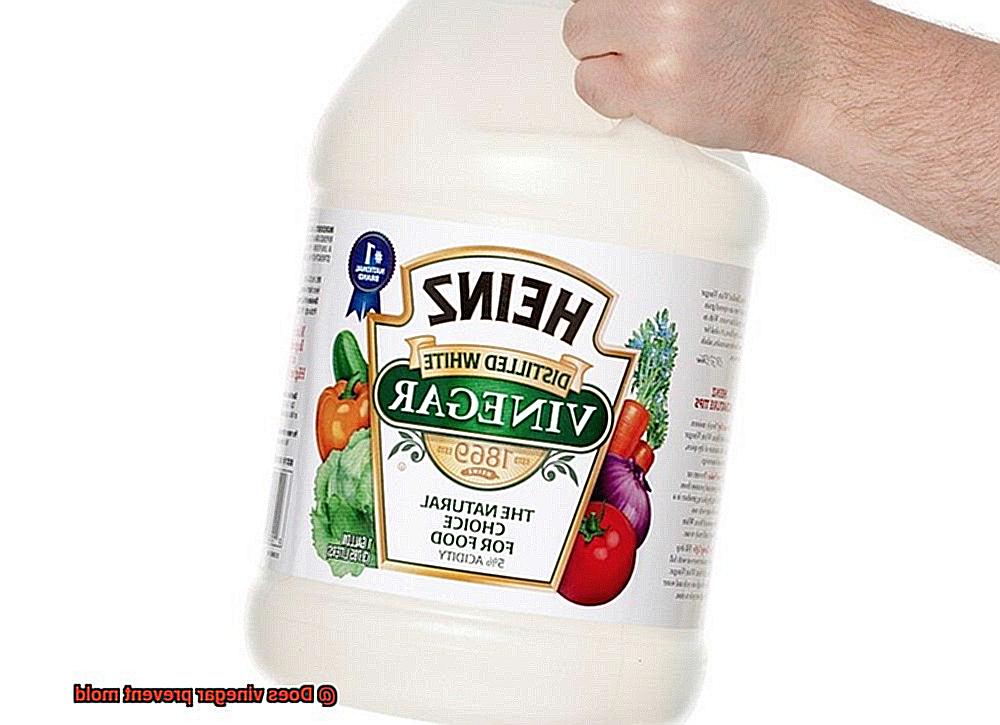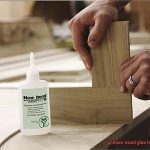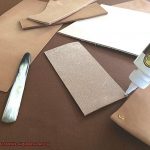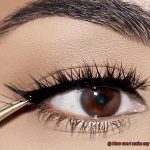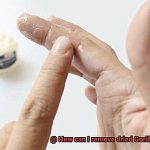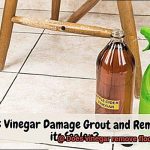Mold, the sneaky intruder that wreaks havoc on our homes and health, is a nightmare we all dread. With countless remedies floating around, it’s hard to separate fact from fiction when it comes to preventing this pesky fungus. But what if I told you there’s a simple kitchen staple that claims to be both natural and effective? Yep, you guessed it – vinegar.
Vinegar has been hailed as a wonder product for ages, with whispers of its mold-busting powers spreading like wildfire. But does it really live up to the hype or is it just another old wives’ tale? In this blog post, we’re diving deep into the science behind vinegar’s mold-prevention claims. We’ll explore its pros and cons, revealing whether this household hero truly lives up to its mold-fighting reputation.
So, whether you’ve battled mold in the past or simply want to keep those black spots at bay, buckle up. We’re embarking on a journey to uncover if vinegar is the champion we’ve all been searching for. Get ready for some eye-opening revelations.
What is Mold?
Contents
- 1 What is Mold?
- 2 The Science Behind Vinegar and Mold Prevention
- 3 How to Use Vinegar to Prevent Mold
- 3.1 Gather Your Materials
- 3.2 Mix the Vinegar Solution
- 3.3 Spray Away.
- 3.4 Let It Sit
- 3.5 Wipe It Clean
- 3.6 It’s important to note that vinegar may not be effective on all surfaces, especially porous ones like wood or drywall. In these cases, it’s best to consult a professional for proper treatment options.
- 3.7 Maintenance is Key
- 3.8 To maintain a mold-free home, it’s crucial to reapply the vinegar solution every few weeks. This will provide continuous protection against mold growth.
- 3.9 Safety Precautions
- 4 Pros and Cons of Using Vinegar for Mold Prevention
- 5 Alternatives to Using Vinegar for Mold Prevention
- 6 Safety Precautions When Using Vinegar for Mold Prevention
- 7 Limitations of Using Vinegar for Mold Prevention
- 8 Professional Remediation May be Necessary in Some Cases
- 9 Conclusion
Mold is a type of fungus that thrives in damp and humid environments. It reproduces by releasing spores into the air, which can easily spread and settle on surfaces. Mold growth is commonly observed in areas with high moisture levels, such as bathrooms, basements, attics, and kitchens. It can appear as fuzzy patches of different colors, including black, green, white, or orange.
Besides causing structural damage, mold poses health risks. Inhaling or coming into contact with mold spores can trigger allergic reactions and respiratory problems. Symptoms may include sneezing, coughing, congestion, watery eyes, and skin rashes. Individuals with respiratory conditions or weakened immune systems are particularly vulnerable to the effects of mold exposure.
To prevent mold growth, it is crucial to control moisture levels. Promptly addressing any leaks or water damage and ensuring proper ventilation in areas prone to dampness are essential. Maintaining indoor humidity levels below 60 percent can also help inhibit mold growth. Regular cleaning and maintenance are important in preventing mold as well.
The Science Behind Vinegar and Mold Prevention
Vinegar, a common household item used for centuries, has gained popularity as a weapon against mold. Mold, a type of fungus that thrives in damp and humid environments, can wreak havoc on our health and homes. But how does vinegar prevent mold growth? Let’s explore the science behind it.
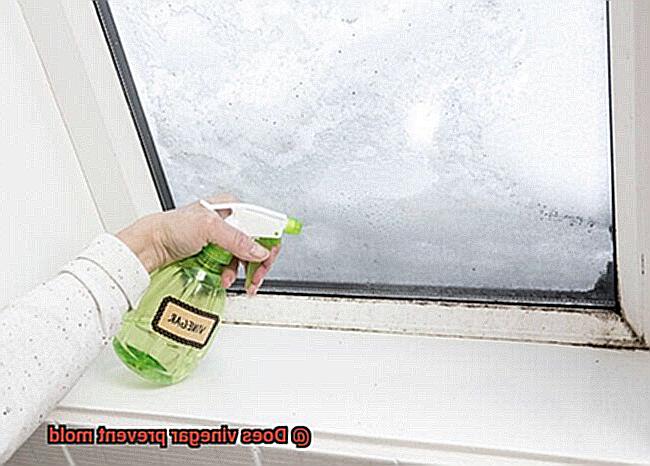
Vinegar, specifically white distilled vinegar, contains acetic acid. This acid is responsible for its sour taste and pungent smell. Acetic acid is known for its antimicrobial properties and has been used as a natural disinfectant for ages. It can effectively kill bacteria, viruses, and fungi, including some types of mold.
When vinegar comes into contact with mold spores or colonies, the acetic acid gets to work. It breaks down the cell membranes of the mold, effectively killing it. However, it’s important to note that vinegar is most effective against small surface molds. For larger or deeply rooted infestations, professional help may be necessary.
The low pH level of vinegar also creates an inhospitable environment for mold growth. Mold thrives in a pH range of 3 to 7, while vinegar boasts a pH level of around 2.This acidic nature makes it difficult for mold to survive and reproduce.
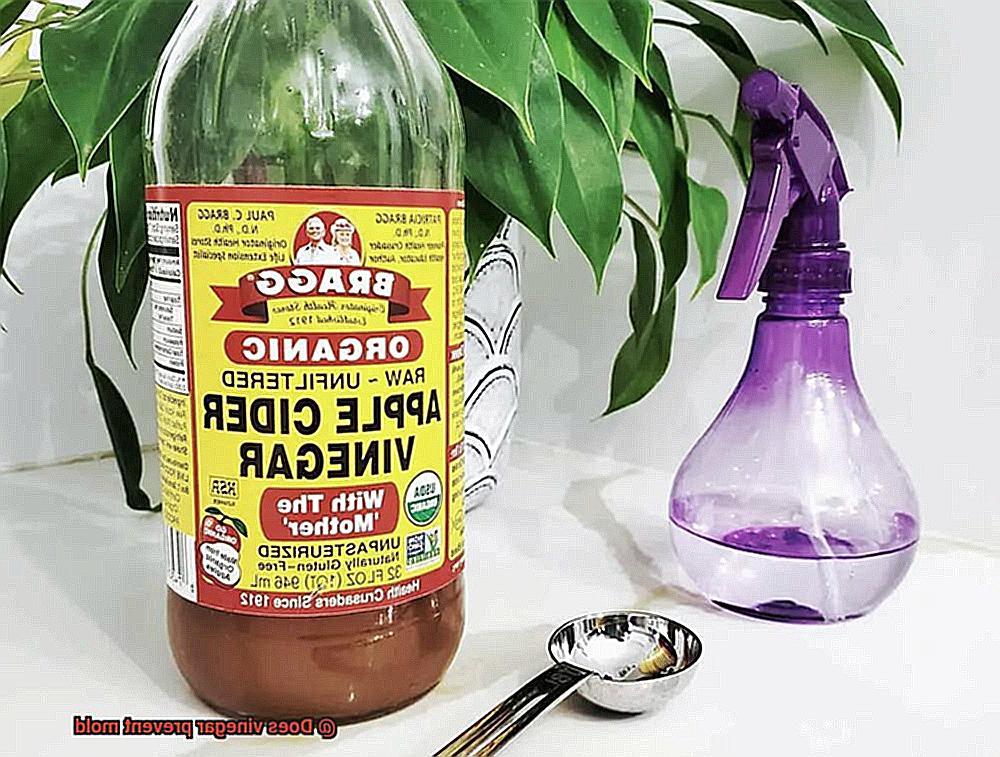
But vinegar does more than just kill mold. Its strong odor acts as a deterrent, signaling to mold that this is not the place to set up shop. Mold seeks out moisture and organic matter for growth, but if it detects the presence of vinegar, it may seek more favorable conditions elsewhere.
While vinegar is an effective mold prevention method, it may not completely eliminate all traces of mold. In cases of significant mold problems, it’s best to consult a professional for thorough cleaning and removal.
When using vinegar to prevent mold, remember to dilute it with water. Undiluted acetic acid can be corrosive and harmful to surfaces. Additionally, wear protective gloves and eyewear to avoid any contact with the vinegar solution.
How to Use Vinegar to Prevent Mold
Vinegar is a powerful and natural solution for preventing mold growth in your home. With its high acetic acid content, vinegar can effectively kill mold spores and stop them from spreading. Here’s a step-by-step guide on how to use vinegar to keep your home mold-free.
Gather Your Materials
Before you begin, make sure you have all the necessary materials. You will need distilled white vinegar and a spray bottle. It’s important to use white vinegar as it works best for mold prevention.
Mix the Vinegar Solution
In a spray bottle, mix equal parts of vinegar and water. Give the bottle a good shake to ensure that the solution is well mixed.
Spray Away.
Now it’s time to target areas where mold is likely to grow. Spray the vinegar solution onto bathroom tiles, shower curtains, basement walls, countertops, and kitchen appliances. Make sure to thoroughly saturate the surfaces with the solution.
Let It Sit
After spraying the vinegar solution, allow it to sit for a few hours or overnight. This will give the vinegar enough time to penetrate deep into the surface and kill any existing mold spores.
Wipe It Clean
Once the waiting period is over, wipe the surfaces clean with a damp cloth or sponge. This will remove any remaining mold residue as well as the vinegar solution.
It’s important to note that vinegar may not be effective on all surfaces, especially porous ones like wood or drywall. In these cases, it’s best to consult a professional for proper treatment options.
Maintenance is Key
To maintain a mold-free home, it’s crucial to reapply the vinegar solution every few weeks. This will provide continuous protection against mold growth.
Safety Precautions
While vinegar is safe to use, there are a few precautions you should take. Firstly, make sure to ventilate the area well when using vinegar, as its strong smell can be overpowering. Secondly, avoid contact with your eyes and skin, and wear gloves and protective eyewear if necessary. Lastly, keep vinegar out of reach of children and pets.
Pros and Cons of Using Vinegar for Mold Prevention
When it comes to preventing mold growth, vinegar is a popular choice due to its natural and non-toxic properties. In this article, we will explore the advantages and disadvantages of using vinegar as a mold prevention measure. While vinegar can effectively kill mold spores on contact and neutralize odors, it may not be as effective on large infestations or provide long-term prevention.
Pros:
Natural and Non-Toxic:
- Vinegar is a safe alternative to chemical-based mold cleaners, making it suitable for use around children and pets.
Antimicrobial Properties:
- Vinegar’s ability to inhibit mold growth and kill mold spores on contact makes it an effective solution for surface mold.
Versatility:
- Vinegar can be used on various surfaces such as walls, ceilings, floors, and fabrics, making it convenient for homeowners to use in different areas of their homes.
Deodorizing Qualities:
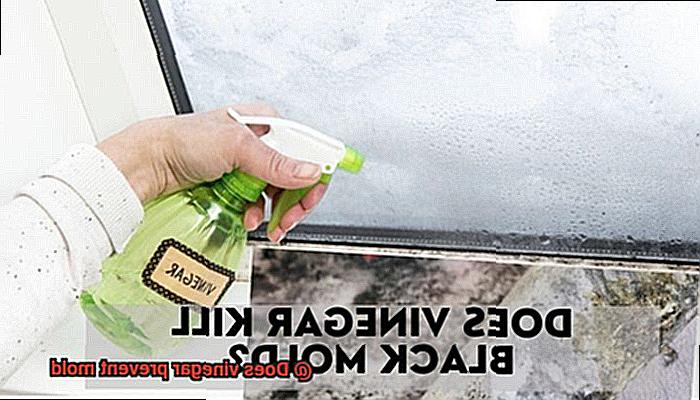
- Vinegar can neutralize unpleasant odors caused by mold and mildew, leaving a fresh and clean scent behind.
Cons:
Limited Effectiveness on Large Infestations:
- While vinegar can kill surface mold, it may not completely eradicate deeper-rooted molds or hidden mold growth.
Strong Odor:
- The strong smell of vinegar may be off-putting for some people, although it dissipates over time.
Potential Damage to Certain Materials:
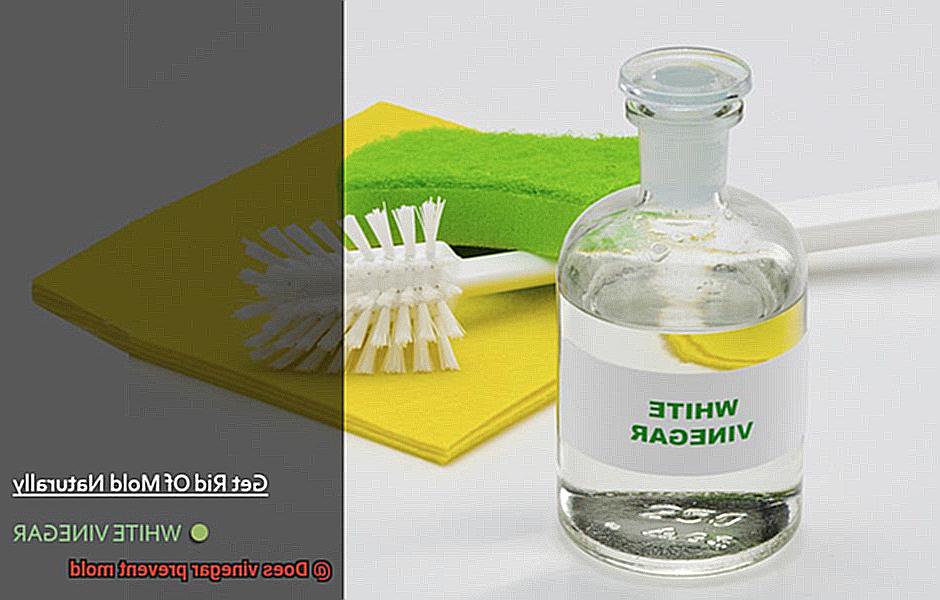
- The acidic nature of vinegar can potentially damage materials such as marble or stone surfaces if not used properly.
Lack of Long-Term Prevention:
- Vinegar does not provide a protective barrier against future mold growth, so regular cleaning and maintenance are still necessary.
Alternatives to Using Vinegar for Mold Prevention
There are several options available that can be just as effective in keeping your home mold-free. Let’s explore these alternatives in more detail.
- Hydrogen peroxide: This powerful disinfectant not only kills mold spores but also has antimicrobial properties. Unlike vinegar, it doesn’t leave behind a strong odor. Simply spray hydrogen peroxide directly onto the affected area, let it sit for a few minutes, and then scrub it away.
- Tea tree oil: Known for its antifungal properties, tea tree oil is a natural alternative to vinegar. Dilute a few drops with water in a spray bottle, and then spray it onto the affected area. Leave it on for a few hours before wiping it away. Remember to dilute tea tree oil, as using it at full strength can irritate the skin.
- Baking soda: A versatile household item, baking soda can absorb moisture and create an unfavorable environment for mold growth. Sprinkle baking soda onto the affected area, let it sit for a few hours, and then vacuum or wipe it away.
- Grapefruit seed extract: This natural alternative contains compounds with antifungal properties that effectively kill mold spores. Mix a few drops with water in a spray bottle and apply it to the affected area. After a few minutes, wipe it away.
- Commercially available mold prevention products: These products often contain ingredients like hydrogen peroxide or tea tree oil and are specifically formulated to kill and prevent mold growth. They offer ready-to-use solutions for those who prefer convenience.
While these alternatives can be effective, it’s important to note that they may not be as widely studied or recommended as vinegar. If you have persistent mold issues or concerns, further research and professional consultation are advised.
Safety Precautions When Using Vinegar for Mold Prevention
Using vinegar for mold prevention is an effective and natural solution, but it’s important to prioritize safety. Here are some key safety precautions to keep in mind:
- Wear protective gear: Before handling vinegar, put on gloves and goggles. This will protect your skin and eyes from potential irritation caused by vinegar.
- Work in a well-ventilated area: Vinegar has a strong odor that can be overwhelming in confined spaces. Open windows or use fans to improve air circulation and prevent respiratory discomfort.
- Avoid mixing with other cleaning agents: Never mix vinegar with bleach or ammonia-based cleaners. This combination can create toxic fumes that are harmful if inhaled. Stick to using vinegar as a standalone cleaning solution or follow specific instructions on safe mixing.
- Dilute vinegar with water: When applying vinegar to mold-infested areas, dilute it with equal parts of water (1:1 ratio). This helps reduce the acidity of pure vinegar and makes it safer to use. Avoid using undiluted vinegar directly on surfaces, as it can potentially damage certain materials like marble or stone.
- Consider the effectiveness on porous materials: While vinegar can effectively kill mold on non-porous surfaces, it may not be as effective on porous materials like wood or drywall. In such cases, professional mold remediation may be necessary for complete elimination.
- Thoroughly rinse treated surfaces: After using vinegar for mold prevention, make sure to rinse the treated surfaces thoroughly with water. This will remove any residue and ensure no leftover vinegar remains, which can attract moisture and potentially contribute to future mold growth.
Limitations of Using Vinegar for Mold Prevention
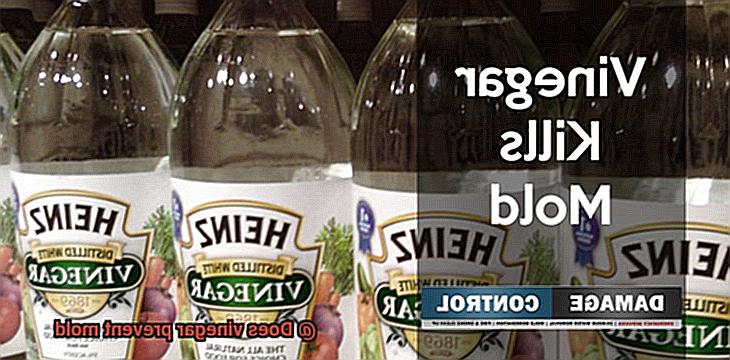
Using vinegar for mold prevention can be a beneficial solution, but it has its limitations. Here are some key limitations to consider:
- Limited effectiveness on large mold infestations: Vinegar is only effective on small areas of mold. For larger infestations or widespread mold growth, vinegar may not be sufficient to fully eliminate the problem. In such cases, it is advisable to seek professional mold remediation services.
- Inability to penetrate porous materials: Mold often grows on surfaces such as drywall, wood, and fabric, which are porous in nature. Vinegar may not be able to reach the roots of the mold within these materials, making it less effective in preventing mold growth in such areas.
- Strong odor: Vinegar has a strong odor that can be unpleasant for some people. While some may find the smell tolerable, others may find it overwhelming or irritating. This can make it impractical to use vinegar as a long-term solution for mold prevention in living spaces.
- Ineffective at removing stains: Even if vinegar kills the mold, it may not be able to completely remove the discoloration caused by the mold spores. This can leave unsightly stains behind, which may require additional cleaning methods or products.
- Temporary solution: Vinegar is a temporary solution for mold prevention. It needs to be reapplied regularly to maintain its effectiveness. This can be inconvenient and time-consuming, especially in areas prone to high humidity or persistent moisture issues.
- Not suitable for all surfaces: It should be noted that vinegar may not be suitable for all types of surfaces. Some materials can react negatively to acidic substances like vinegar, leading to damage or discoloration. It is important to test vinegar on a small, inconspicuous area before using it on larger surfaces.
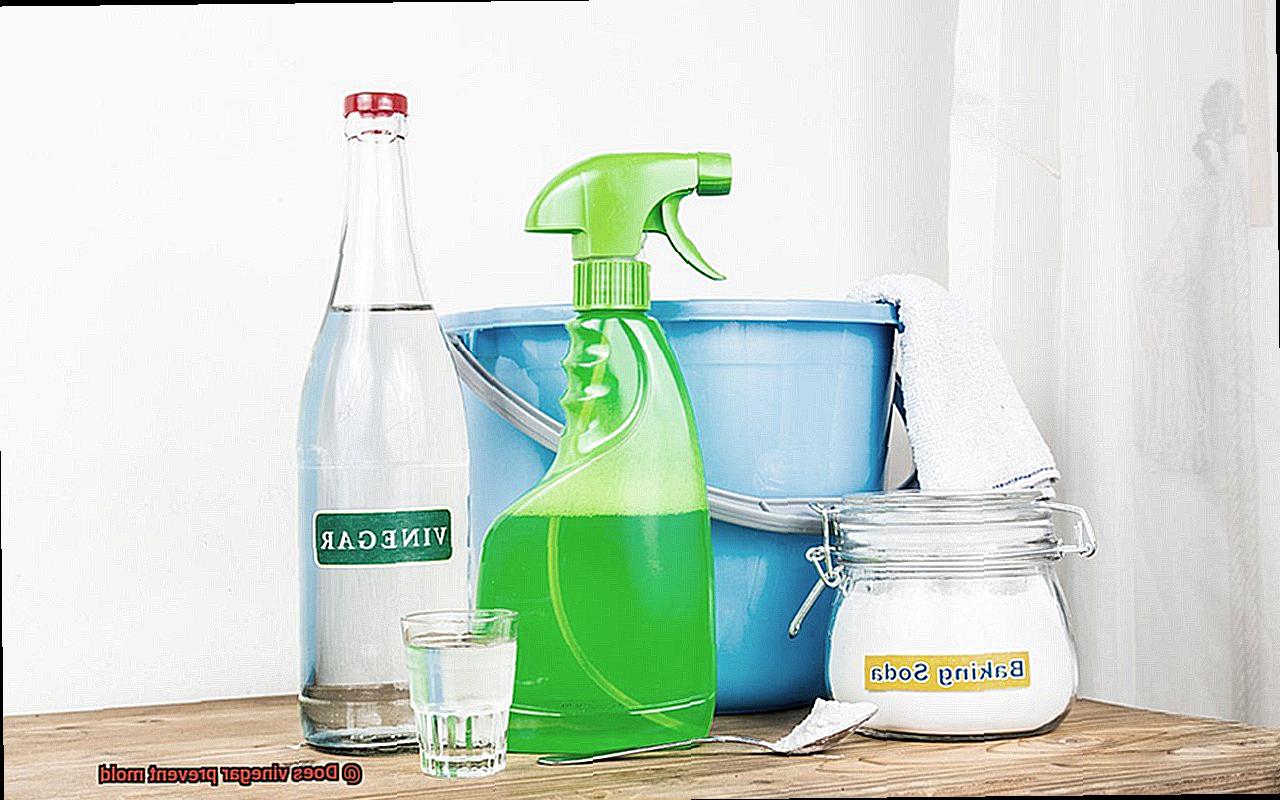
Professional Remediation May be Necessary in Some Cases
In the battle against mold, sometimes the fight requires reinforcements. When faced with severe or extensive mold growth, it becomes clear that professional remediation is not only necessary but essential. This revelation is supported by a wealth of research and evidence, which highlights the unique advantages that professionals bring to the table.
First and foremost, professional remediation is crucial when the extent of mold growth reaches its zenith. Whether it covers a large area or lurks in hard-to-reach places, the power of DIY methods like vinegar falls short in these cases. The complexity of the situation demands specialized equipment and techniques that only professionals possess.
Equipped with state-of-the-art tools and an arsenal of techniques, these experts have honed their craft to ensure safe and effective mold removal. HEPA filters, negative air machines, and containment measures are just a few examples of the specialized equipment they employ to prevent the spread of mold spores. Their expertise extends beyond mere equipment operation, as they conduct thorough inspections to evaluate the scope of the problem and identify underlying causes such as water leaks or high humidity levels. Armed with this knowledge, they can create a tailored remediation plan designed to address the specific situation at hand.
Certified in proper mold remediation procedures, professional remediators possess a wealth of training and expertise that guarantees effective and safe removal of mold. Their knowledge extends beyond the immediate problem, as they also possess the skills necessary to identify and address underlying moisture issues that could lead to future mold growth.
Engaging a reputable and experienced professional remediation company is paramount when tackling such a formidable foe. With their guidance, you can rest assured that the job will be done correctly and effectively. Vinegar may prove effective for small-scale mold problems or serve as a preventive measure, but it pales in comparison to professional remediation when dealing with severe or extensive mold growth.
jWPVv_ePqN8″ >
Conclusion
In conclusion, vinegar is a powerful weapon against mold in your home. With its high concentration of acetic acid, it boasts antimicrobial properties that swiftly obliterate mold spores upon contact, leaving no room for further growth. Unlike chemical-based cleaners, vinegar is a natural and non-toxic alternative that ensures the safety of your loved ones, including children and pets.
However, it’s essential to bear in mind that vinegar may not conquer larger or deeply entrenched mold infestations with the same ease. In such cases, enlisting the expertise of professional remediation services becomes imperative to ensure thorough cleaning and complete eradication.
To employ vinegar effectively as a mold prevention agent, dilution with water is key. Armed with a trusty spray bottle, you can target affected areas directly. Remember to don protective gear, choose a well-ventilated space for your battle against mold, and avoid any temptation to mix vinegar with other cleaning agents.
While vinegar enjoys popularity as a go-to option for mold prevention, it’s worth exploring alternatives such as hydrogen peroxide, tea tree oil, baking soda, grapefruit seed extract or commercially available mold prevention products. These substitutes may offer comparable effectiveness in thwarting the growth of mold.
Ultimately, whether you opt for vinegar or another method hinges on the severity of the problem and personal preference. Regardless of the chosen approach, regular cleaning and maintenance remain paramount in preventing mold from taking hold in your home.
Should you find yourself facing an overwhelming onslaught of mold growth or an extensive infestation, seeking guidance from a professional remediation company is undoubtedly the wisest course of action.

